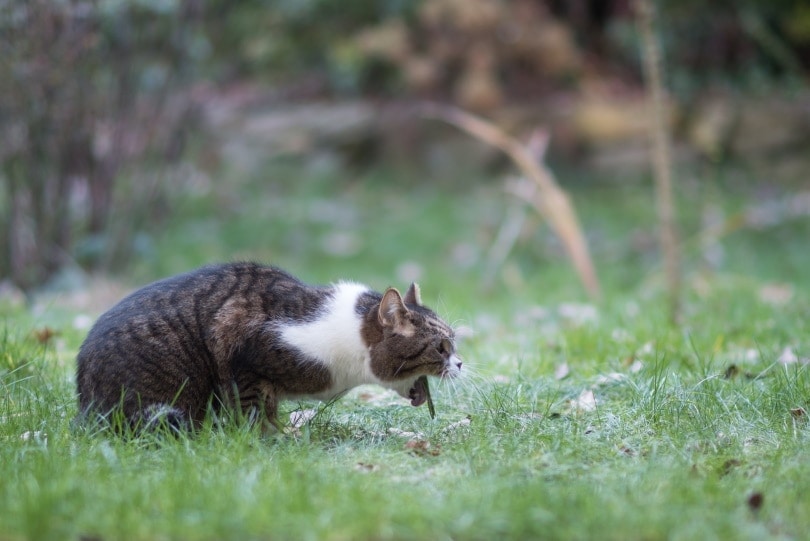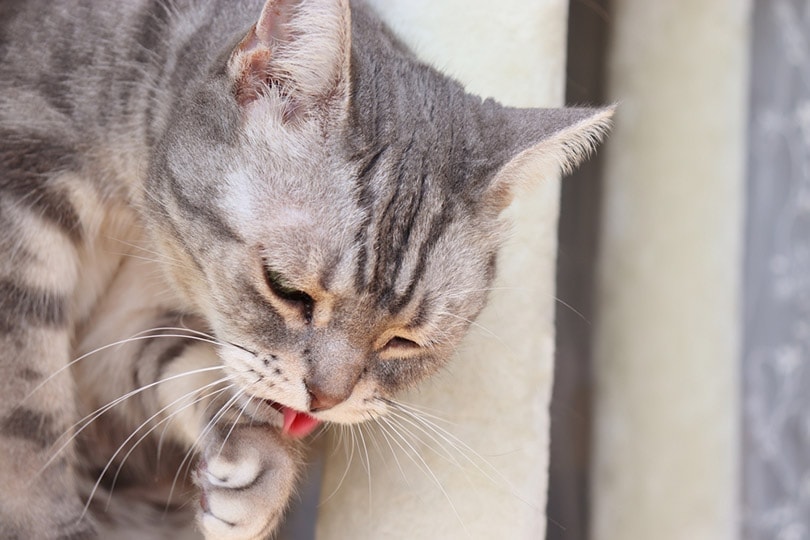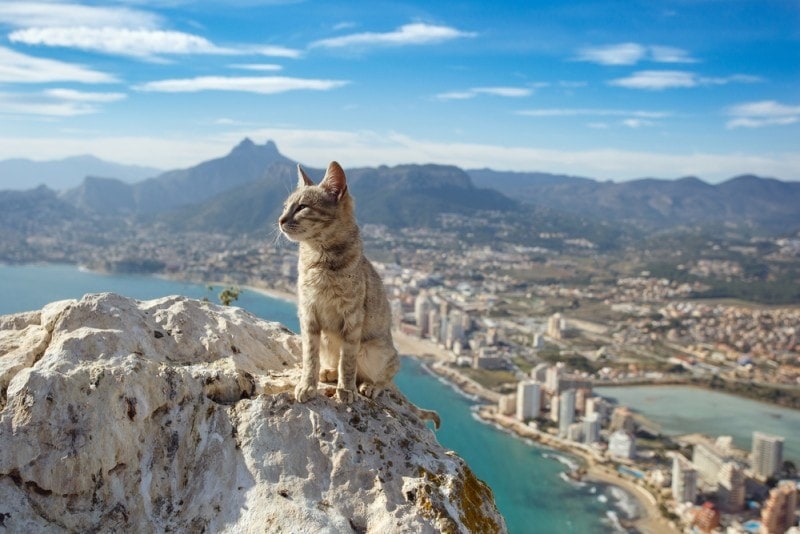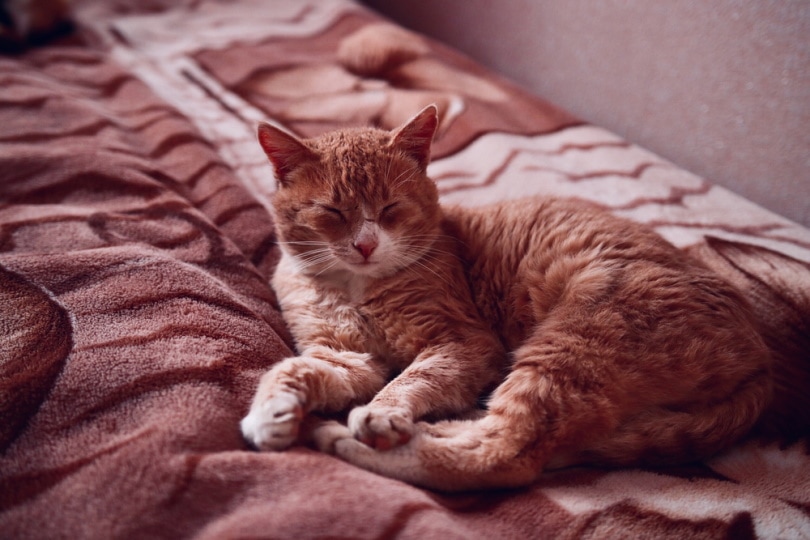Can Cats Eat Lentils? Nutrition Facts & FAQ
By Ashley Bates
Updated on

As a cat owner, it can be a little nerve-wracking sometimes when our kitties eat things we prefer they didn’t. After all, you have cleaning products, chemicals, food items, and other finds in your home that can be real threats to our felines. But for you, it might be as simple as your feline trying to get in on your soup and bread Sunday dinner.
With hearty warm meals in mind, are lentils on the list of potentially toxic foods for cats? You’ll be happy to know if your kitty got a mouthful of this little legume, it’s perfectly fine—though we don’t recommend switching out your cat’s daily kibble for lentils, of course! Here’s more.
Lentil Nutrition Facts

- Amount Per: 1 tbsp
- Calories: 14
- Cholesterol: 0 mg
- Sodium: 0 mg
- Potassium: 45 mg
- Total Carbohydrate: 5 g
- Protein: 1 g
- Iron: 2%
- Magnesium: 1%
What Are Lentils?
Lentils are protein-rich legumes known for lens-shaped seeds. While the growth of lentils is moderately widespread, they are cultivated mainly in Canada and India, which produce 58% of lentils on production between both countries.
Lentils are often mistaken for beans, but that’s not the case. Lentils are related and have a similar taste and texture, but they offer much different makeup than plants in the bean family.
Because they are so high in protein, they are often a perfect addition to a vegetarian or vegan diet. However, in carnivorous animals, the plant-based protein doesn’t make up for any lack of animal-based protein.
Why Cats Need Animal Protein
Cats need animal protein because it contains the correct nutrients they need to survive. Perfectly balanced, animal protein has just the right amount of amino and fatty acids that fed your cat’s muscles, coat, and skin.
Animal protein also aids in immune and nervous system support. It’s one of the five primary nutrients carnivores need. Cats require a minimum of 30% of the protein in their daily diet.
Health Benefits of Lentils for Cats
Lentils may be small, but they’re loaded with goodness. These healthy little pods are tasty and packed with nutrients even your cat can benefit from.
Even though lentils aren’t on a cat’s natural menu, they will get a few health benefits in their quick bite of food.

Protein Content
In one serving of cooked lentils, there are 1.1 grams of protein. This protein nourishes the muscles, skin, and coat, creating an overall healthy musculoskeletal system. Even though it isn’t as valuable to cats as animal protein, it still delivers a little extra dose.
Iron
Iron is essential mineral mammals need to survive. Iron helps to boost your cat’s red blood cells, making sure it can flow, clot, and replenish as it should. In lentils, it contains 2% iron content.
Potassium
Potassium is a natural electrolyte in the body that assists in the function of the muscular and nervous systems. In a serving of lentils, there are 45 milligrams of potassium.
Downfalls of Lentils for Cats
Cats are carnivorous ruffians. Even though you have your occasional lazy daisies, most cats would literally jump at the chance to pounce on a live mouse. In the wild, cats eat meat strictly—and they get most of their hydration from their food source as well.
Domesticated cats have come far from their days in the great unknown. Because of that, our spoiled house cats have quite a different diet than they once did.
Lentils can make an excellent addition to a homemade snack bowl with lots of other yummy ingredients, but it doesn’t work well as a standalone snack. Too many lentils can give your cat an upset tummy—plus, they don’t meet all the nutritional needs of your kitty.
- Upset stomach
- Nausea
- Vomiting
- Diarrhea
- Rumbling in the belly
This isn’t vet-worthy, but your guy or gal will probably be miserable until they digest it all.

Potentially Dangerous Foods Often Served with Lentils
One major concern here is not with lentils themselves but their recipe pairings. Lentils can go in quite a few delicious recipes that might be quite tasty for us, but potentially lethal for our cats.
Here are some additional ingredients to watch out for:
Garlic/Onions/Chives/Shallots/Scallions/Leeks
What we are saying here is anything at all in the allium family is completely toxic to cats. It doesn’t lose toxicity when it is cooked down, dehydrated, or condensed. These potent veggies are completely dangerous for dogs and cats alike.
Cayenne Pepper
Cayenne pepper isn’t technically toxic to pets, but it can make them feel very ill. Luckily, the capsaicin in the pepper wards cats away naturally, often used in cat repellents. However, if it’s in a recipe with many other flavors, they might ingest it without realizing it.

How to Serve Your Cat Lentils
If your food is free of any potentially harmful ingredients, you can give them a taste. Many cats will like lentil soups because of the broth and meat therein.
Or, you can add in lentils to a little mixed medley of kitty-safe, kitchen-prepped treats. Lentils can go with just about any cat-friendly food item, but there are tons of DIY recipes all over the web.
To avoid gastrointestinal upset, you should limit your cat’s intake to about once a week, but no more.
Now that you know what you can safely feed your cat, it’s just as important to find a bowl that supports their health and well-being. With whisker-friendly bowls and a wide tray to catch any spills, our Hepper NomNom Cat Bowl is our favorite option.
Lentils + Cats: Final Thoughts
So, yes, your cat can eat lentils—but only in moderation. They are not a part of your cat’s natural diet, but they do offer some protein, iron, and a kick of potassium.
Remember, while lentils are non-toxic, you should consider other ingredients, too. If your dish was soup or a savory recipe, look over the list to ensure it’s free of potentially harmful spices or veggies—like garlic or cayenne pepper. If so, go to your vet immediately.
Related Reads:
Featured Image Credit: aitoff, Pixabay














